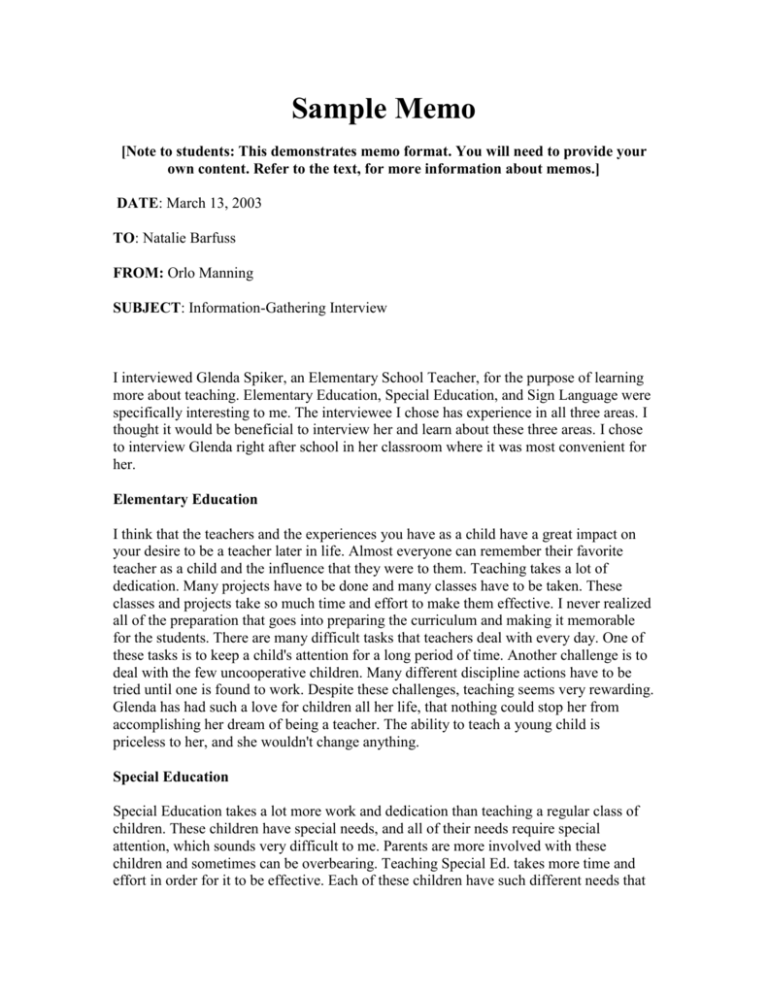Sample Memo
advertisement

Sample Memo [Note to students: This demonstrates memo format. You will need to provide your own content. Refer to the text, for more information about memos.] DATE: March 13, 2003 TO: Natalie Barfuss FROM: Orlo Manning SUBJECT: Information-Gathering Interview I interviewed Glenda Spiker, an Elementary School Teacher, for the purpose of learning more about teaching. Elementary Education, Special Education, and Sign Language were specifically interesting to me. The interviewee I chose has experience in all three areas. I thought it would be beneficial to interview her and learn about these three areas. I chose to interview Glenda right after school in her classroom where it was most convenient for her. Elementary Education I think that the teachers and the experiences you have as a child have a great impact on your desire to be a teacher later in life. Almost everyone can remember their favorite teacher as a child and the influence that they were to them. Teaching takes a lot of dedication. Many projects have to be done and many classes have to be taken. These classes and projects take so much time and effort to make them effective. I never realized all of the preparation that goes into preparing the curriculum and making it memorable for the students. There are many difficult tasks that teachers deal with every day. One of these tasks is to keep a child's attention for a long period of time. Another challenge is to deal with the few uncooperative children. Many different discipline actions have to be tried until one is found to work. Despite these challenges, teaching seems very rewarding. Glenda has had such a love for children all her life, that nothing could stop her from accomplishing her dream of being a teacher. The ability to teach a young child is priceless to her, and she wouldn't change anything. Special Education Special Education takes a lot more work and dedication than teaching a regular class of children. These children have special needs, and all of their needs require special attention, which sounds very difficult to me. Parents are more involved with these children and sometimes can be overbearing. Teaching Special Ed. takes more time and effort in order for it to be effective. Each of these children have such different needs that it seems almost impossible to teach them all at the same time. The curriculum is not as advanced and fast paced as that of a normal class. Communicating with the students is harder and definitely takes a lot of patience. These children seem harder to discipline, although I don't think they would need to be disciplined as often. Getting attached to these children seems to be easy because they could grow so close to you and sometimes even become dependent on you. To me, teaching Special Ed. seems emotionally tiring compared to other classes. It takes a very special person to teach Special Ed. and to teach well. Sign Language My interviewee doesn't teach sign language, but she uses it in the school a lot. This language is amazing to me. I would think learning how to sign would be hard for a deaf person because they can't speak. However, it is just like a young child learning to speak English or any other language. Learning sign language takes time and a good example. The language consists of signs and symbols representing words. They have an alphabet that can be used to spell anything if the sign for it is unknown. There are no set signs for names of people, usually they are just spelled out by signing the letters of the alphabet, or the person can make up a sign for themselves. Signing can be done fast or slow just like speaking fast or slow. Tones and expressions can be also be shown in signing by the look on the signer's face or the body language they use while signing. Sign Language is fascinating, and I think everyone should learn some of it. Interview Analysis From this interview I learned a lot about a teaching career. I think I learned even more about how to conduct an information-gathering interview. I had always known that teaching requires a good deal of patience and that the monetary rewards are not great. The information Glenda gave me verified that view. I think this is something I can live with. I was inspired by her ability to reach out to these students, and I feel I could contribute a lot in this area. What surprised me most was the difficulty of conducting an interview that flows well. I had written my questions ahead of time, but I hadn't really practiced saying them out loud. Sometimes Glenda would answer part of one of my later questions while I was asking her one of my original questions. This interrupted my logical organization of the interview. It was all really good information, but it didn't seem very organized. I ended up losing track and skipping a few of my questions. Also, it was hard to maintain eye contact with her, listen to what she was saying, remember her points, and get ready to ask my next questions all at the same time. I ended up just reading my questions off the paper. It sounded kind of stiff. Next time I conduct an interview I will become very familiar with all my questions so I can orchestrate the interview better.






